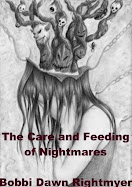"Following Hope" (Xlibris, April 2007), my first collection of poetry, set the tone for the intentions of my career. A resounding effort to shatter the stereotype of what is expected of an Appalachian poet, the collection is a true celebration of multiculturalism, travel, and multimedia.
The poems therein are varied in make. There are multi-stanza poems, short meditative pieces, lyric free verse and melodic alt-forms. This is less the pastoral, ancestor-oriented work commonly associated with Appalachian literature and more the complex, interpretive and experimental lyrics of contemporary poetry as is being written throughout America and the Western world today.
The subjects are also more profound than might normally be expected. The predominate theme is that of betrayal on many levels, but mostly in the area of sexual violence and its aftermath. Also addressed is abandonment by a parent, by a lover, by nature and by life- real or perceived. The betrayal of the self is not left out of this equation. It is not a collection for the squeamish or those more comfortable with light verse and greeting card verse. These are serious pieces about thought-provoking, serious subjects.
But not all is dark. While not flinching from these indescribable experiences, the collection focuses on the ability of the human spirit to rise above such horrors: to always look for hope (a white bird always refers to hope), to refuse to remain victimised, to use these experiences to learn strength, and even to be able to open oneself up to vulnerability and relationships willingly and unfailingly loyally.
The photos peppered generously throughout the book reflect this positivism. Taken by Northern Irish photographer Jan McCullough, they are mostly clean youthful portraits with stunning emphasis on the eyes of the models. A few were taken by myself and these are credited appropriately in the acknowledgements section. The cover photo was taken by Jessica Marshallsay quite by accident, but what a lovely accident!
The end result is a visually pleasing book that reflects the message of the poems therein. It has received glowing reviews every time it has been reviewed. These reviews can be read at my website, (www.sabneraznik.com). Following Hope is available everywhere online- including Amazon.com and Ebay.com- in softcover format. It is also available in hardcover if ordered directly from the publisher at www.xlibris.com/FollowingHope.html.
My second collection is still in manuscript form and currently making the rounds in search of representation and/or a publisher. It's title is in a state of flux. "Whethering: shiir" was thrown out because similar titles have been used for poetry collections recently. Currently, its working title is "Habibi". It will continue the aims of stereotype breaking and take it to another level. The poems will be even more varied. There will be experimentation with syntax, concrete poetry, even shorter poems, my first attempt at blank verse, and my only attempt thus far at a performance piece.
These poems are love songs which remain interpretive in nature and, therefore, have multiple possible meanings. These are addressed to a lover, an unrequited love, God, and the exotic all at once. There will be a notes section which will translate phrases and words that appear throughout in a total of 11 or 12 different languages, some of them ancient. These notes will also help with references made throughout that shift all through the long and rich history of the Middle East. It will be a celebration of the beautiful, of music, photography, dance, love, loss, hope, Appalachia, and language. All of this climaxes in an eerily Irish sort of keening to full effect.
The photography of Jan McCullough will be featured once again, this time all alone. From the cover and on, every photo will be McCullough's work. These will be scattered more sparsely throughout. This time, the photos are abstracts of broken, rain-damped streets superimposed with artistic nudes.
I do not know when it will be available for sale since I am still looking for an agent and/or publisher, but I can assure you it will be worth the wait. The interpretations of my work given in this article are subjective and merely one way of perceiving it. I believe it is the perogative of the reader to apply it to their individual situations as it suits them.
WHY ARE WE HERE
5 years ago










